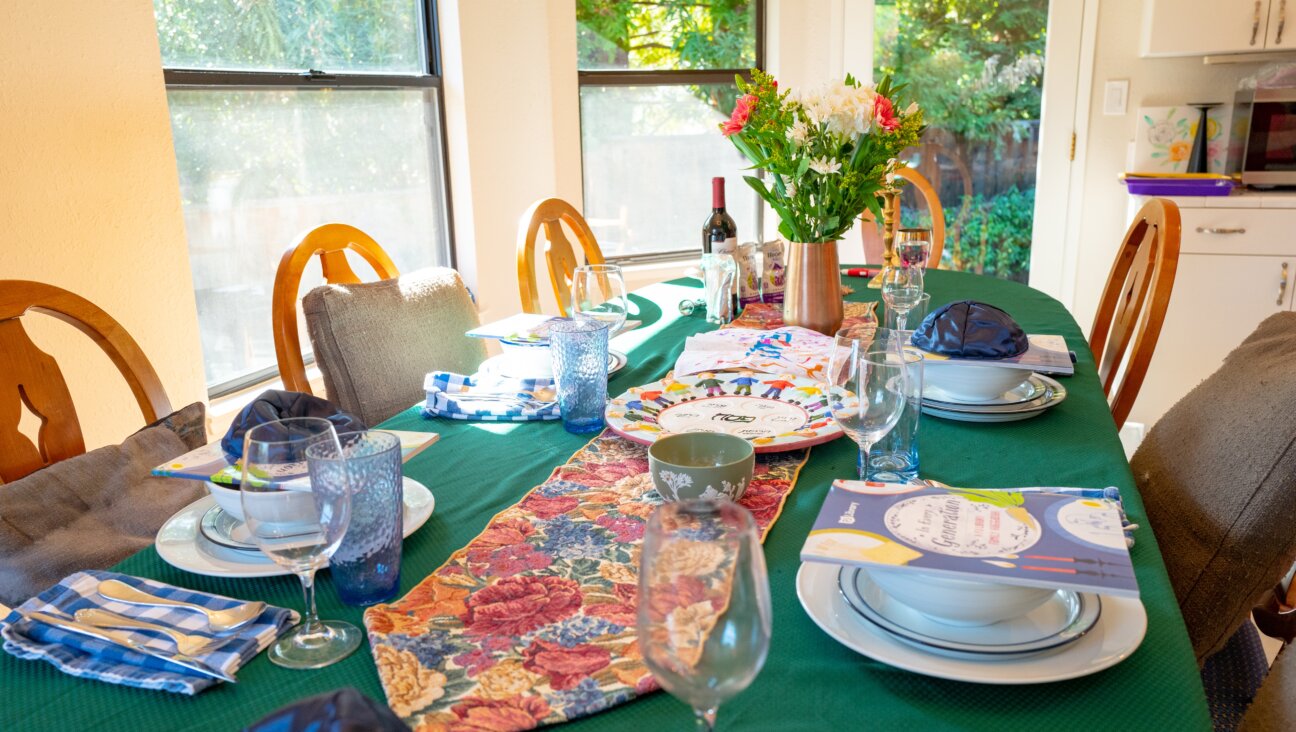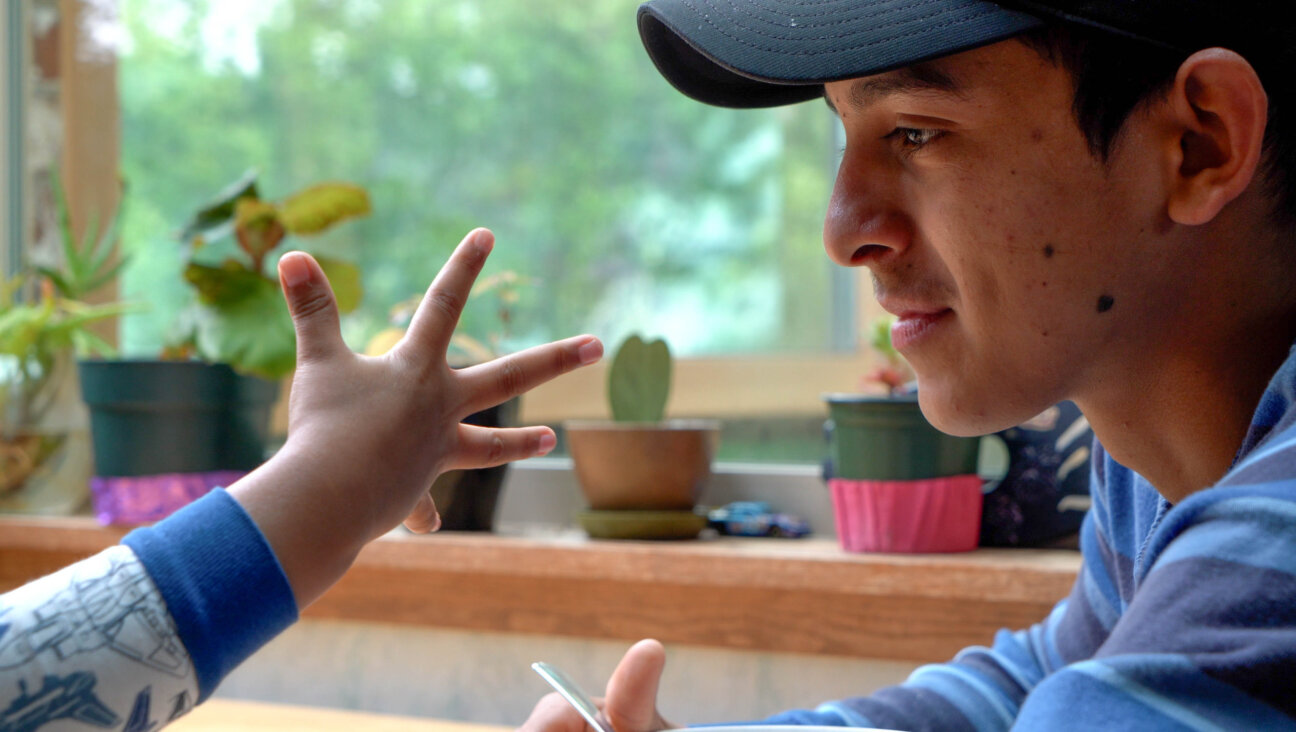Can Shabbat be #self-care? For me, the answer was yes — maybe

Image by Angelie Zaslavsky
Sometimes, when I quit Slack and stow away my laptop on a Friday afternoon, I go on Instagram and scroll through pictures of challah.
Plain challah, rainbow challah, challah embellished with candied flowers. Hefty, round challah and etiolated mini challahs scattered artfully across a pristine baking sheet. Challah posed next to minimalist Shabbat candlesticks or ironically kitschy ones, thriving houseplants and Mediterranean-inspired one-bowl dinners.
Posted by Jewish lifestyle influencers or social media-savvy nonprofits, the challahs come with captions like “Weekday life can be so stressful…but then Shabbat comes to the rescue!” or “Taking a PAUSE before the pursuit” or “Openness, freedom and flexibility are your birthright!” Appearing on well-curated Instagram feeds, these loaves that require so much attentive proofing and kneading and braiding signify that their makers are experiencing Friday night intentionally. They’ve created an aesthetically appealing boundary between the rigors of the workweek and the restoration of the weekend. Fortified by this mindful activity, I imagined, the proficient challah bakers of Instagram might start a Vulture-recommended miniseries after dinner, or watch a New Yorker-endorsed movie, or fulfill resolutions to eschew blue light before bed.
View this post on Instagram
Slumped over my laptop in a the posture my physical therapist decries, that was usually more than I could say for myself. Even reading the words mindful and intentional made me want to fritter away an afternoon watching bottom-tier BBC period dramas. But it also seemed like it would be nice to experience openness, flexibility and freedom as my birthright. In the square Instagram frame of my mind, I opened an oven much nicer than the one I own to reveal a gleaming, golden challah. So one Friday I rummaged through my kitchen cabinets, where, like every naïve millennial with overambitious plans for quarantine, I had several unopened packages of Fleischman’s Active Dry Yeast.
I may have had little experience baking bread or observing Shabbat, but the posts that propelled me into the kitchen were already familiar. I was already enamored of them, and I already felt skeptical. On the Jewish corners of social media, people are trying to translate ancient Jewish rituals — among them, the weekly practice of baking challah — into an accessible, modern vernacular that appeals to a broad constituency of young(ish) Jews like me. And they’re taking their aesthetic and linguistic cues from a phenomenon with which I’ve been long acquainted: self-care.
The phrase “self-care” may evoke pedicured toes peeking out of a bubble bath, but the concept has a more collectivist history than its present-day deployment suggests.
Michel Foucault, never one to leave a #discourse undisturbed, traced the idea to the classical era, when philosophers like Seneca and Socrates argued that if one wanted to care for a larger community, it was necessary to “care for oneself” first. In the 1960s, feminist health clinics used the term when teaching women to perform pelvic exams on each other. Two decades later, Audre Lorde gave the phrase its best-known political valence when she argued that by behaving kindly to herself, she was defying a society that consistently devalued — that is, refused to care for — Black women, queer people and single mothers like her. Caring for herself, she wrote, “is self-preservation, and that is political warfare.”
Self-care saw another resurgence after the 2016 election, when many Americans began participating in civic life, or experiencing civic stress, in a new, more intense way. But like so many liberatory concepts, it quickly became a branding tool to sell things, mostly to women. Self-care once meant taking a bath after going to a demonstration, or writing down your feelings after watching Brett Kavanaugh have an eight-hour temper tantrum in Congress. Now, the self-care routines available to — and, indeed, expected of us — are much more elaborate.
Any bath worth taking these days is accompanied by an activated charcoal bath bomb, or at least a Gwyneth Paltrow-certified “bath soak,” whatever that is. Instead of just keeping a diary, you might want to consider a color-coded bullet journal with a timeline for achieving your goals and aspirations. Hydration means nothing if you don’t do it with the right water, and a good night’s sleep is irrelevant if it doesn’t involve mulberry silk pillowcases. When I scroll through Instagram, advertisements and sponsored posts entreat me to buy an ever-expanding array of products in the name of self-care. Many seem suspiciously more likely to make me look better than feel better: Salon processes to remove undesirable hair from my body, for example, vie with influencer-certified serums to make my eyebrows thicker and lashes more lustrous.
Less of a restorative process than an increasingly expensive task list, today’s self-care seems to leave little time for the kind of civic action it’s supposed to counterbalance. But the social media savants promoting a distinctly Jewish brand of self-care believe that this secular phenomenon can be a vehicle for their messages. And they want to meet young Jews where they’re at — which, a lot of the time, is online, trying to figure out what it means to take care of yourself.
“That’s the bathwater we’re in right now,” said Rebecca Missel, a leader at DIY ritual website Custom and Craft.
If you follow Modern Ritual, a Jewish lifestyle Instagram account created by two rabbis in their early 30s, you’ll probably become slightly addicted to their Shabbat stories.
An interactive series of polls that appear each Friday on Modern Ritual’s profile, the stories offer ways of celebrating Shabbat that seem to have little in common with the blessings you learned in Hebrew school. “This Shabbat, I am nourishing my body with…” one prompt reads, offering a choice between “delicious dinner” or “delectable dessert.” The questions change from week to week, but they generally focus on personal rest and communal connection. One week, the poll asked me to “reach out” by calling a friend or writing a note. Another, I chose between “intentional movement” or “intentional rest.” Whatever you decide, you can see how your choices stack up to those of other Modern Ritual devotees. (When I clicked “rest,” refusing even the vaguest commitment to weekend exercise, I could see that 60% of fellow respondents had done the same.) Every week, the last slide reminds followers that they are created “in God’s image” and comes with one answer: “I am worthy of love.”

Modern Ritual’s Shabbat stories always end with the same affirmation: “I am worthy of love.” Image by Modern Ritual
To someone like me, steeped in an online world where influencers speak a similar dialect, the language in which Modern Ritual couches Shabbat observance feels extremely familiar. And that’s no accident.
“We have always wanted to be intentional about communicating with our peers in a language that felt natural to us,” said Rabbi Samantha Frank, one of the account’s two co-creators. “The person we think we’re talking to when we write a post is living in a mostly secular context, so much of their language is secular. Our job is to invite them into the Jewish conversation.”
Modern Ritual is just one of several groups finding analogues for Jewish observance in modern ideas of self-care. At The Well, an organization attempting to revive the ancient practice of women’s circles on Rosh Chodesh (the first day of the Hebrew month), hosts gatherings where attendees learn breathwork exercises and candle-pouring rituals. Custom and Craft, which started out helping people make DIY haggadahs, now shares home-based rituals for many different holidays. For the process of counting the Omer, a 49-day ritual leading up to the holiday of Lag b’Omer, Custom and Craft released a calendar of 49 reflective activities. Many of the prompts — “Take an afternoon break from technology” or “Make a collage inspired by something you find beautiful,” — smack of the secular world of self-care. They also hint at the potential of self-care to spur social change: On Day 12, participants are instructed to call their elected officials “to make sure relief packages are distributed justly.”
OneTable, an organization focused exclusively on Shabbat that provides post-college Jews with resources to host Friday night gatherings, frames the holiday less as a religious or even spiritual obligation than a psychological reset. The word “pause” features prominently in the organization’s materials, and its homepage informs visitors that Shabbat is a time to “take a breath, to let go, to reconnect.” OneTable’s Instagram feed, full of practical tips for Shabbat newbies, uses the visual language of ease and relaxation familiar to online millennials: fairy lights, votive candles, long picnic tables strewed with linen napkins.
“We have very intentionally positioned Shabbat as the centerpiece of Jewish self-care, and used that language from day one,” said Rabbi Jessica Minnen, OneTable’s director of Jewish learning.
That positioning, of course, has its practical advantages: It allows Jewish groups to get in on a widespread and very powerful trend. Sarah Waxman, who founded At The Well after mikvah rituals helped her overcome a history of disordered eating, said she was motivated by a dearth of Jewish groups addressing health and wellness. “It felt like there was this wave the Jewish world was missing,” she said.
View this post on Instagram
Yet the women who spoke to me also see their work as deeply grounded in Jewish tradition. In their telling, they’re not just replacing your grandmother’s gilded menorah with a matte millennial pink one; they’re stripping away the language that can make Jewish tradition seem intimidating or out-of-touch to reveal ancient principles for a life well-lived. When creating Modern Ritual’s Shabbat stories, Frank said, she takes inspiration from the activities she personally finds restorative, like workout classes. But underlying her posts are biblical imperatives: When followers indulge in a “decadent dessert,” she pointed out, they’re fulfilling the injunction in Isaiah to find oneg, or “delight,” in the holiday.
And some see themselves as reviving rituals that have fallen by the wayside in an era when so much of Jewish life takes place within synagogue walls. Long before At The Well started using the hashtag #biblicalbabes, Rosh Chodesh was considered a special holiday for Jewish women. Waxman attributes its relative obscurity today to a lack of communal interest in activities that focus on women’s needs.
“We don’t have to worry about the rules of our movement, we don’t have to worry about our board members, so we’re able to just get real with people,” said Eileen Levinson, the founder of Custom and Craft. As the organization expanded its at-home ritual offerings during the pandemic, it attracted a broad constituency of followers — not just millennial Jews to whom self-care is usually marketed but older, shul-going women who needed to refashion their Jewish lives for quarantine and queer Jews and converts who had never felt at home in institutional settings.
Still, leaders of the organization make sure to emphasize they’ve done their liturgical homework. While leading a virtual workshop on at-home altars, seemingly a newfangled innovation, Custom and Craft’s Missel was careful to explain ancient precedents like mizrachs, elaborate plaques that used to adorn the eastern walls of Jewish homes. “I am not taking you down the path of idolatry in the next 45 minutes of this webinar,” she quipped.
I baked my first loaf of challah on a gray winter day midway through the pandemic. For an aspirational but accident-prone cook who had already destroyed multiple sourdough starters, the rewards were high. Eight hours after sprinkling yeast in a bowl of water, I possessed an ugly but extremely edible loaf and a more distinct sense than usual of what day it was. Later that night, I stayed awake for the entirety of a Criterion Channel film, an unprecedented personal feat which confirmed my suspicions: I had successfully engaged in an act of Jewish self-care.
I don’t bake challah as consistently as I click through Modern Ritual’s Instagram stories, but I do it often enough that I’ve memorized the Smitten Kitchen recipe. (Which, if you decide to take up this method of self-care, is the only one you need.) In the past few months, I’ve bought a silicone baking brush to improve my egg wash distribution campaign. I’ve acquired everything bagel seasoning to boost my garnishing game. I’ve made tiny loaves and beneficently bestowed them on unsuspecting friends.
This small ritual has, despite its trendiness and exactly as promised by the many people who encourage it on Instagram, made me feel better — a lot better. But I still questioned my motives for cultivating it. In a world where self-care is part of the performance of a full life, it’s difficult to distinguish the legitimate urge to do nice things for ourselves from the desire to check the right boxes. As my challahs got more presentable, I posted them on my long-dormant Instagram. I sent photos of loaves swaddled in IKEA dish cloths to group chats full of people who could not care less. “Yummy,” my mom responded, a word that, in her dialect, means Didn’t you say you were going to apply to graduate school this year? I started searching things like “teak cheese plate” on Etsy. I may yet buy one.
View this post on Instagram
Perhaps because of the ease with which self-care can become a pantomime of well-being, most of the people I spoke to were wary of the phrase itself — “empowerment” and “intentionality” were popular alternatives. When I asked Minnen of OneTable if she was worried about stepping into waters that had been so thoroughly muddied by the forces of brandification, she said it was important to acknowledge the “toxic positivity” at the heart of so much self-care content. Celebrating Shabbat, she pointed out, is not going to “clear up your skin or get rid of the bags under your eyes or make you lose 10 pounds.” (I and my prominent under-eye bags can personally confirm this.)
But she didn’t see herself as engaging with self-care out of necessity, or strategizing to sell secular Jews on synagogue memberships. For her, the combination of Judaism and self-care, even if served on a conveniently chic cheese plate, is a way into the egalitarian essence of both traditions. “It’s very clear in the Torah that Shabbat is good for you, it’s good for your friends and family, it’s good for the people who work with you and for you,” she said.
“Shabbat, in that way, is really countercultural,” Frank added. When it comes to rest and who’s entitled to it, “there’s a complete democratization.”
I was surprised to hear this. Even though I enjoy baking challah so much that I am publicly admitting to participating in self-care, it would be a stretch to call this ritual a “complete democratization” of anything. But I don’t think this is Frank’s fault — instead, it’s a testament to Instagram’s limits. In using the language of conventional self-care to introduce followers to a more communitarian vision of Jewish tradition, she and her compatriots are engaged in an effort more radical than their tasteful feeds let on. But while they can provide the scripts, it’s up to me — and all the other Jews out there indulging, moving, postcarding, reaching out or counting the Omer with intentions — to figure out how our own well-being can contribute to some broader purpose.
That’s a life’s work. In the meantime, on Friday mornings I measure out yeast and flour and eggs. I knead the dough until I can stretch it thin and let light shine through, a grandmother’s trick that I learned via Instagram tutorial. I divide the dough and braid it and watch it rise while I clear my inbox for the weekend. Sometimes, it feels like a chore. Sometimes, my keyboard is dusted flour when I log onto a Zoom meeting. Sometimes, I forget to do it at all.
Sometimes, it feels like I’m taking care of myself.
























